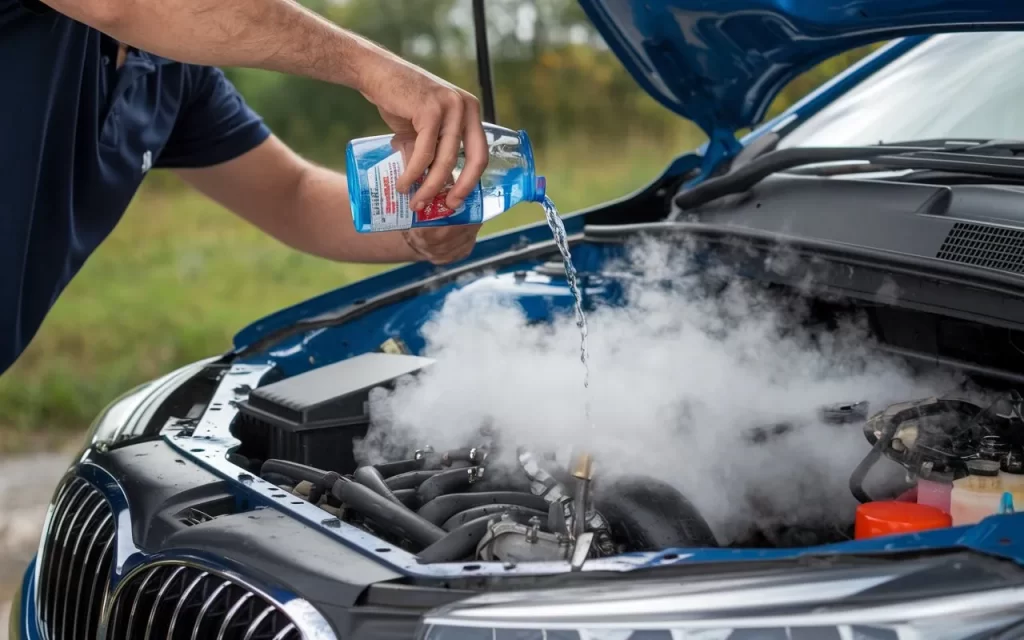Table of Contents
Regarding maintaining the coolness of your engine, the first thing that comes to mind is antifreeze or coolant. But what if you find yourself in a pinch and wonder, “Can you use water as coolant?” You might be surprised by the answer. We’ll go into great detail about the facts in this essay, myths, and potential dangers of using water as a coolant. You’ll have all the information needed to make an educated choice by the end.
Can You Use Water as Coolant? Why Is Coolant Needed and What Does It Mean?
Before we answer the question, “Can you use water as coolant?”Let’s look at the purposes of coolant in your car first. Coolant is a liquid used to manage your engine’s temperature. It is specially formulated to not only prevent overheating but also to protect the engine from freezing during cold months.
How Coolant Works
As coolant flows through the engine, heat is taken in and sent to the radiator. Once there, the heat dissipates, and the coolant recirculates, maintaining the engine’s optimal temperature. Coolant also contains chemicals that prevent rust and corrosion, ensuring the longevity of your engine.
Can You Use Water as Coolant in an Emergency?
If you’re stuck without coolant, you might be tempted to use water as a temporary solution. Can you use water as coolant? Yes, you can, but only in a short-term emergency. Water can cool your engine in a pinch, but it comes with risks.
Short-Term Solution
Using water instead of coolant is better than nothing, especially if you are far from a repair shop or in a dire situation. However, it’s essential to replace it with proper coolant as soon as possible. Water lacks the vital additives that protect your engine from rust and freezing temperatures.
Can you use water as coolant? The Risks of Using Water as Coolant
While using water as a coolant may seem harmless, it has several risks that could damage your engine over time. Let’s break down the dangers:
Overheating
One of the most significant risks is becoming too hot. Compared to coolant, water has a lower boiling point. Therefore, it will evaporate or boil faster. If your engine gets too hot, water won’t be able to keep it cool efficiently, leading to potential damage.
Corrosion and Rust
Unlike coolant, water does not contain anti-corrosion agents. Using water as a coolant can lead to rust formation in your engine, radiator, and other cooling system parts. This rust can cause blockages, reducing the efficiency of the cooling system and leading to expensive repairs.
Freezing in Cold Weather
Water cannot also prevent freezing. If you live in a region with cold winters, water as a coolant can freeze, leading to engine block damage. Frozen water can expand, causing severe issues within the engine and radiator.
Can you use water as coolant? The Advantages of Coolant Over Water

Now that we’ve covered the risks of using water as a coolant, it’s crucial to understand why traditional coolant is superior. Coolant offers more than just heat management for your engine.
Higher Boiling Point
Coolant is designed to withstand higher temperatures without boiling. This is critical during hot weather or when driving long distances. With water, you risk reaching the boiling point much faster, leading to engine overheating.
Rust Protection
Coolant additives protect the engine from corrosion. Coolant additives protect the engine from corrosion. And corrosion, keeping your cooling system running smoothly. This benefit is something water as coolant cannot provide.
Freeze Protection
In cold weather, coolant ensures your engine doesn’t freeze. With antifreeze properties, coolant remains fluid and prevents the freezing that can occur with water.
When Can You Safely Use Water as Coolant?

While coolant is always the best option, can you use water as coolant safely in certain circumstances? Yes, there are some cases where using water temporarily might be okay.
Short Trips in Mild Weather
If you’re taking a short trip in mild weather, water can work as a temporary fix. You’ll want to monitor the engine temperature closely, though. As soon as possible, replace the water with the correct coolant to avoid long-term damage.
In Emergencies Only
Using water as a coolant should always be a last resort. If you find yourself stranded and have no other options, water can get you to the nearest repair shop. Make sure to flush the system afterward and add the appropriate coolant.
Also Read: Food Chain Of The Taiiga: Unveiling Nature’s Survival Secrets
How to Switch from Water to Coolant
If you’ve used water in an emergency, switching back to coolant is vital for engine health. Here’s a quick guide to replacing water with coolant.
Step 1: Let the Engine Cool
When the engine is hot, never try to open the radiator cap. Let the engine cool completely before proceeding to avoid burns.
Step 2: Drain the Water
Locate the radiator drain plug and allow the water to flow out. Be sure to capture it in a container for proper disposal. Draining the water is crucial to avoid mixing it with the coolant.
Step 3: Refill with Coolant
Once the system is drained, refill it with the recommended coolant for your vehicle. Make sure the mixture is balanced to protect against both heat and freezing.
Step 4: Check for Leaks
After replacing the water with coolant, check for any leaks. Leaks can cause air to enter the cooling system, leading to overheating.
So, can you use water as coolant? The answer is yes, but only as a temporary solution in emergencies. Water can get you through a tough spot, but it’s not a permanent fix. The risks of using water, such as overheating, rust, and freezing, far outweigh the benefits.





